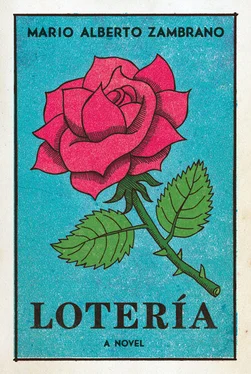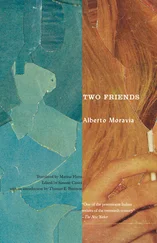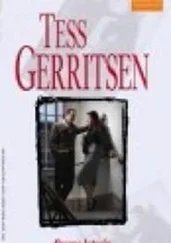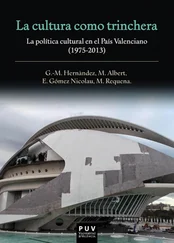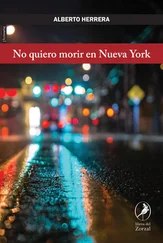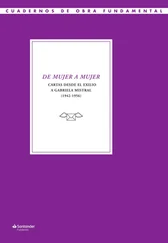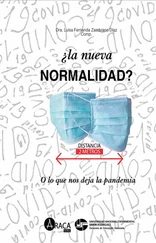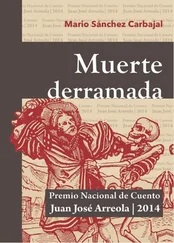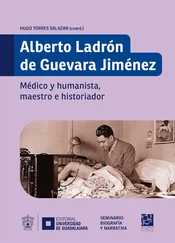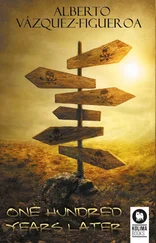I saw Papi in the living room trying to break free from their grip. There were two of them. A white man and a Mexican. The Mexican was speaking Spanish like if Papi didn’t understand English, trying to pin him down. I ran to Papi’s bedroom and stuck my hand under the mattress and grabbed the rifle. I held it against my chest. “You’re under arrest,” I heard them say. I walked down the hallway with the rifle aimed toward their voices. The white man must’ve seen me because I heard him say I had a gun. He backed away with his hands facing me, like if I weren’t real and he couldn’t believe I’d appeared. He fell to his knees and said, “Put the gun down, little girl. Put it down.”
He turned to Papi and asked, “What’s her name? Tell her to put it down.”
Papi looked at me, and I knew by the way he looked at me he wanted me to do whatever I had to do.
Estrella thought Papi had taken Mom somewhere in the woods and beaten her until she couldn’t breathe. She thought he had strangled her. “That’s why we can’t find her,” she said to me. “Because he buried her! He’s an animal, Luz! Don’t you get it?”
Papi fought back and so they thought he was guilty. That’s how it happens. That’s why they were in shock when they saw me. They never thought it would come from me. They didn’t know I was in the other room.
“Leave him alone!” I shouted.
When they looked at me, stupid and stunned, Papi broke free from their grip and grabbed a knife off the kitchen counter. He saw me and wanted a weapon of his own. He waved it in the air. But he was drunk. He’d been drinking and he lost his balance. Then, behind the officers and through the front door, I saw Estrella running toward the house. The Mexican officer tried to grab the knife and the white officer came toward me. Estrella ran inside, waving her arms, screaming, “DON’T! DON’T!”
But my finger felt stuck around the trigger and the officer grabbed the barrel and I pulled, and he pulled, and then the sound was so loud it knocked me down. On my back, in that moment when the air was knocked out of me, I thought, It’s done. It’s over. They wouldn’t take Papi and everything was okay. They just had to leave us alone.
But when I lifted my head I saw her on the ground with her cheek on the floor and her hair over her face. My mouth opened but no sound came out. Other officers came in and grabbed me and carried me out of the house by my arms and legs. Papi screamed like a dog being held down, yelling over and over again, “¡Hija! ¡Es mi hija!”
I heard the ambulance. The sirens. But it felt like I was hearing them from underwater. Like if I were sinking and something was filling my ears, and the sounds were beginning to fade, except for Papi screaming.
As they carried me to the car, facing up, all I can remember, all I could see were the stars.
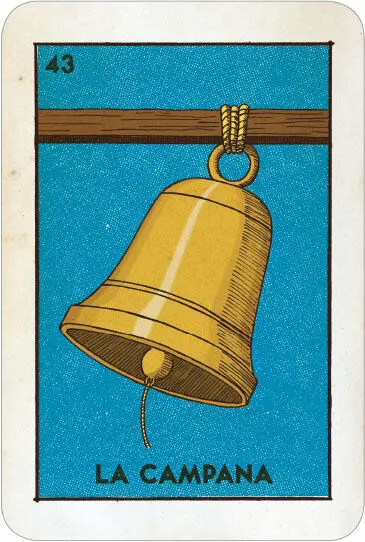
We’d go to Buelita Fe’s house and hear church bells. Do — ong! Do — ong! Do — ong! Go to mass by ten and be out by half past eleven, then be in her backyard playing by the time it struck noon. We’d chase each other and I’d trip on a rock and brush off the dirt from my knees and see the blue and red mix together. I’d get up and run around the tree, go inside the garage and hear it again: Do — ong! Do — ong! Not able to find her, I’d stop trying and go inside and forget. When it was over, I could still hear them. She’d creep up and say, “Where’d you go?” And I’d say, “I’m right here. I’ve been here the whole time. You’re the one who got lost.” She’d run inside or to the back of the house and leave me there, sitting by myself, with the bells in my head and the bells in the trees. Still ringing. Do — ong! Do — ong! Do — ong!
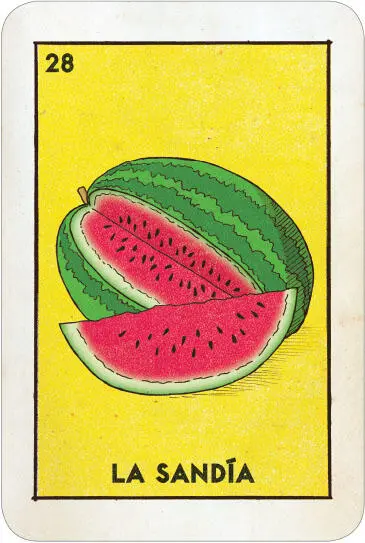
Iwoke up this morning and I couldn’t find my journal. No one was awake so I went to the counselor’s office, and there it was on her desk, by the printer next to the phone. I grabbed it and flipped through it. They hadn’t changed anything or marked in it, but still. How did they find it? It was there. Someone went to my room and took it. And I’m sure they read it, but which part? In the hallway I looked to the exit where the security officer was sitting, leaning back, listening to some news channel on his stupid radio. I went over to him and knocked on the glass, “Hey!” I screamed, and he was shocked by the sound of my voice. It was the first time he had heard it. He flinched and turned around. “What about my rights?” I screamed. They were thieves. The man, tall now, standing, looked at me. “Why aren’t you in bed?” “Because!” I yelled. “You like it when people take your things?” “Calm down,” he said and opened the door. He tried to reach for my shoulders but I backed away. The hall lights turned on and I heard Larry from down the hall. “What’s going on?” he said, coming out of the counselors’ lounge. “What?” I said. He looked at the journal in my hand, with his stunned and stupid face, probably because it was the first time he heard my voice. “You took it!” I screamed. “You can’t take my things!” Then he tried to catch me, but I kicked him between his legs.
In my room, crying all stupid, my mouth wet, I shoved my bed in front of the door. I went to the shower and turned the cold knob as far as it’d go. The journal got wet when I opened the first page and the letters began to smear. I was about to tear it into pieces so that no one could ever figure out what I’d written. But something stopped me. I threw it out and it landed on the sink. Then, under the shower, I turned the knob to hot and grabbed it with both hands. I wanted to hit my head against the wall but I was too chicken, then I was mad for being too chicken. My skin turned pink, and to keep moving I grabbed the shampoo and covered myself with it.
Larry and the officer banged on the door, over and over again, until I screamed as loud as I could. “THIEVES! You hear me! THIEVES!”
And then they stopped.
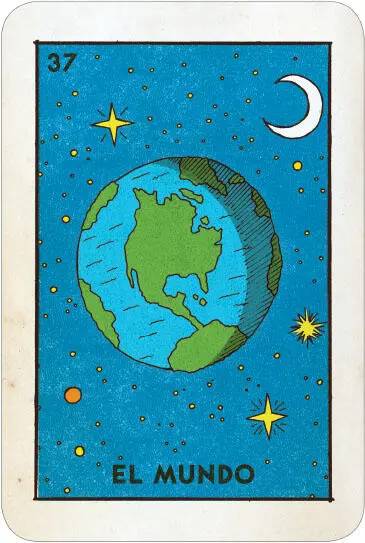
There was a photograph from their wedding day in a frame under the television. You can tell it was Papi who took the shot, the way Mom is running away from him, looking back, the veil between her and the lens. When you look at the photo you know he’s smiling too. You can sense it. Entre ellos no hay nada en el mundo que no tenga sentido .
Tencha gave me a photo of myself the other day and I tried to remember being a two-year-old sitting on the counter with flour on my face. My hair was red then, which is weird because now it’s black. The ones who love me say, Sí, mija, eres tú. I have no choice but to believe them. In the photograph, the girl has a smile over her face, her mouth is half-open, and there’s a pasty white mess between her fingers.
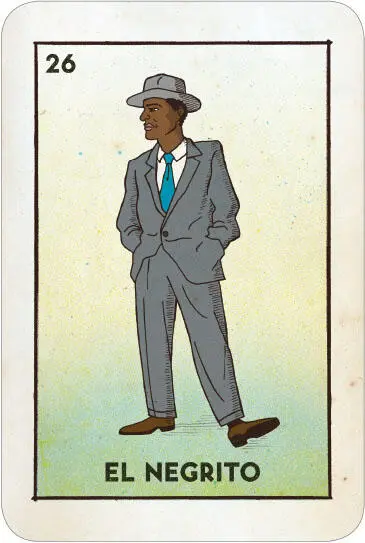
This is what Julia said to me this morning.
“Larry thought it might be a good idea if I was the one who spoke to you. I know it’s been awhile since you’ve been here and that’s what I’d like to talk to you about.”
Читать дальше
